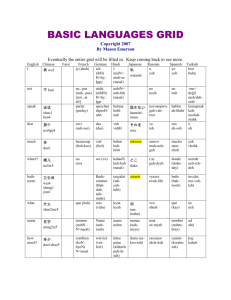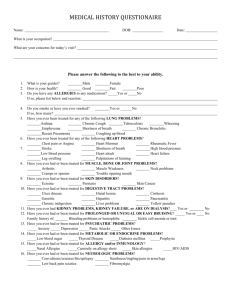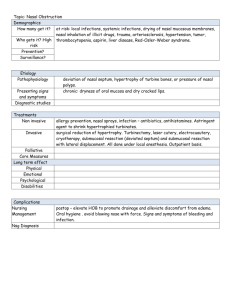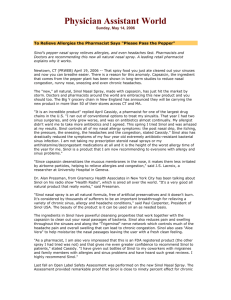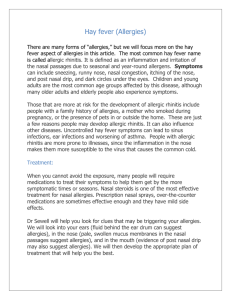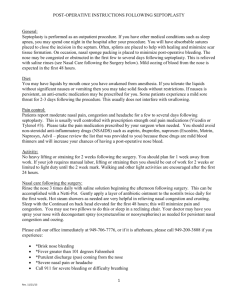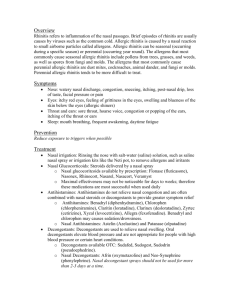Allergies
advertisement
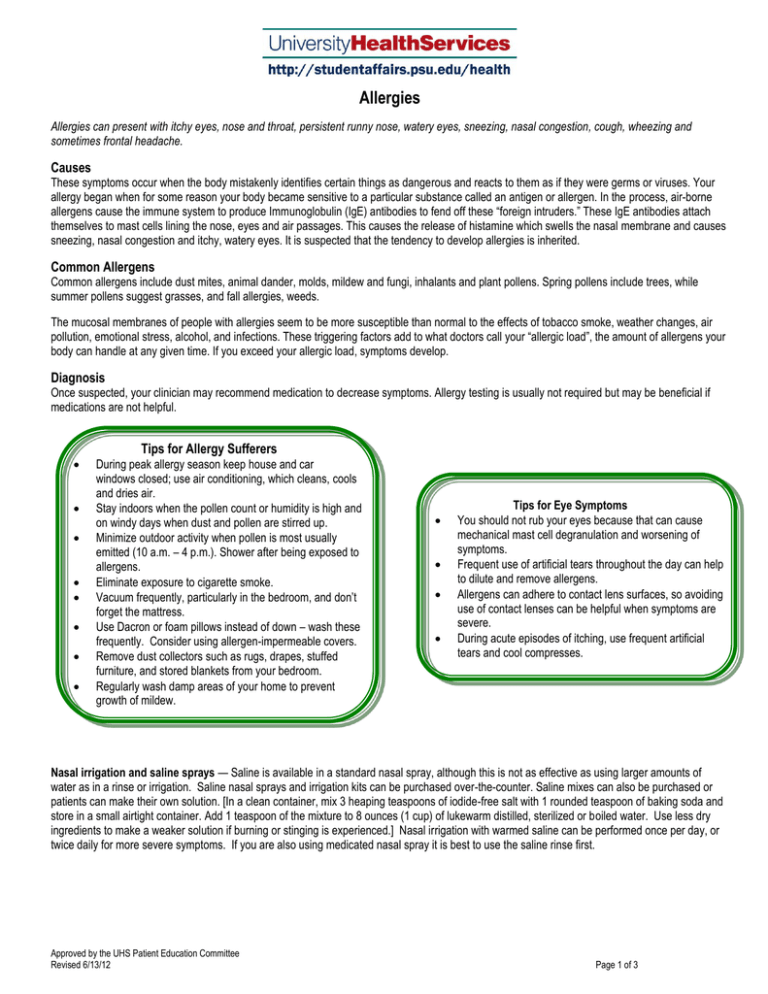
Allergies Allergies can present with itchy eyes, nose and throat, persistent runny nose, watery eyes, sneezing, nasal congestion, cough, wheezing and sometimes frontal headache. Causes These symptoms occur when the body mistakenly identifies certain things as dangerous and reacts to them as if they were germs or viruses. Your allergy began when for some reason your body became sensitive to a particular substance called an antigen or allergen. In the process, air-borne allergens cause the immune system to produce Immunoglobulin (IgE) antibodies to fend off these “foreign intruders.” These IgE antibodies attach themselves to mast cells lining the nose, eyes and air passages. This causes the release of histamine which swells the nasal membrane and causes sneezing, nasal congestion and itchy, watery eyes. It is suspected that the tendency to develop allergies is inherited. Common Allergens Common allergens include dust mites, animal dander, molds, mildew and fungi, inhalants and plant pollens. Spring pollens include trees, while summer pollens suggest grasses, and fall allergies, weeds. The mucosal membranes of people with allergies seem to be more susceptible than normal to the effects of tobacco smoke, weather changes, air pollution, emotional stress, alcohol, and infections. These triggering factors add to what doctors call your “allergic load”, the amount of allergens your body can handle at any given time. If you exceed your allergic load, symptoms develop. Diagnosis Once suspected, your clinician may recommend medication to decrease symptoms. Allergy testing is usually not required but may be beneficial if medications are not helpful. Tips for Allergy Sufferers During peak allergy season keep house and car windows closed; use air conditioning, which cleans, cools and dries air. Stay indoors when the pollen count or humidity is high and on windy days when dust and pollen are stirred up. Minimize outdoor activity when pollen is most usually emitted (10 a.m. – 4 p.m.). Shower after being exposed to allergens. Eliminate exposure to cigarette smoke. Vacuum frequently, particularly in the bedroom, and don’t forget the mattress. Use Dacron or foam pillows instead of down – wash these frequently. Consider using allergen-impermeable covers. Remove dust collectors such as rugs, drapes, stuffed furniture, and stored blankets from your bedroom. Regularly wash damp areas of your home to prevent growth of mildew. Tips for Eye Symptoms You should not rub your eyes because that can cause mechanical mast cell degranulation and worsening of symptoms. Frequent use of artificial tears throughout the day can help to dilute and remove allergens. Allergens can adhere to contact lens surfaces, so avoiding use of contact lenses can be helpful when symptoms are severe. During acute episodes of itching, use frequent artificial tears and cool compresses. Nasal irrigation and saline sprays — Saline is available in a standard nasal spray, although this is not as effective as using larger amounts of water as in a rinse or irrigation. Saline nasal sprays and irrigation kits can be purchased over-the-counter. Saline mixes can also be purchased or patients can make their own solution. [In a clean container, mix 3 heaping teaspoons of iodide-free salt with 1 rounded teaspoon of baking soda and store in a small airtight container. Add 1 teaspoon of the mixture to 8 ounces (1 cup) of lukewarm distilled, sterilized or boiled water. Use less dry ingredients to make a weaker solution if burning or stinging is experienced.] Nasal irrigation with warmed saline can be performed once per day, or twice daily for more severe symptoms. If you are also using medicated nasal spray it is best to use the saline rinse first. Approved by the UHS Patient Education Committee Revised 6/13/12 Page 1 of 3 Allergies Nasal steroids are sprayed directly inside your nose. They work to prevent your nose and sinuses from becoming inflamed when exposed to an allergen such as pollen. Clinical studies have shown that they are safe and highly effective in reducing symptoms. Adverse effects are rare and usually due to irritation from the spray solution itself. Relief is not immediate! The maximum effect usually occurs within 2 weeks. Nasal steroids are best used continuously for weeks to months, depending on your symptoms. When using a steroid spray the head should be positioned normally or with the chin slightly tucked. The spray should be directed away from the nasal septum/center of the nose. The spray is dispensed and then sniffed in slightly to pull it into the higher parts of the nose. Sniffing too hard will result in the medicine draining down the throat, and should be avoided. (Look at your toes, spray up your nose.) Steroid sprays may cause nasal irritation. If your nose bleeds consistently with use, stop using the medication and see your clinician. Oral Antihistamines are for runny nose, sneezing and cough. The most effective oral antihistamines are first generation, although they tend to cause drowsiness. Examples of first generation antihistamines are *brompheniramine (generic for DimeTapp), *chlorpheniramine (generic for ChlorTrimeton and Singlet), *diphenhydramine (generic for Benadryl), and *doxylamine (generic for NyQuil and Alka-Seltzer Plus Night-Time Cold Medicine). The newer oral antihistamines may not be as effective, but are non-sedating. Examples are *loratadine (Claritin), *fexofenadine (Allegra), and *cetirizine (Zyrtec). Nasal Antihistamines are prescription nasal sprays that can be used daily or when needed to relieve symptoms of post-nasal drip, congestion, and sneezing. These sprays start to work within minutes after use. Oral Decongestants are used for stuffy nose and congestion. The only effective oral decongestant currently available is *pseudoephedrine. You must ask the pharmacist for this medication (regulated because of illegal use to make methamphetamine), although no prescription is required. Decongestants purchased off the shelf contain phenylephrine and are much less effective. Oral decongestants may produce rapid heart rate, blood pressure elevation, nervous stimulation, and restlessness which may interfere with sleep. Nasal Decongestants are an alternative to the oral medication. One example is *oxymetazoline hydrochloride (generic Afrin). This can rapidly relieve nasal obstruction. When the decongestant effect of the drug wears off, nasal obstruction rapidly returns. Therefore, this can be very effective, but limit use to 3 days in a row. Overuse by just a few days can result in “rebound” obstruction and mucosal damage. * Available over-the-counter. Other Treatments: Leukotriene inhibitors are medications that were once used for asthma treatment. They are anti-inflammatory medications and have been found to be effective in some individuals with nasal allergies. Ipratropium, nasal atropine, is effective for the treatment of severe runny nose. It is a prescription medication and needs to be applied 2-4 times daily. Cromolyn Sodium nasal spray is effective in seasonal allergic rhinitis by preventing the mast cells from releasing inflammatory substances. Adverse effects are relatively rare. It must be used several times daily. Immunotherapy (allergy shots) is generally reserved for those individuals who fail to sufficiently respond to the above treatment methods. This process is typically started by an allergist and administered over 3-5 years. Eye-drops for allergy treatment: Antihistamine-decongestant eye drops are available over-the-counter and are relatively inexpensive. These drugs are only recommended for shortterm use (no more than three days) since regular use of a decongestant may cause rebound congestion. Examples are naphazoline HCL/pheniramine maleate (generic for Naphcon-A or Visine-A). Approved by the UHS Patient Education Committee Revised 6/13/12 Page 2 of 3 Allergies Mast cell stabilizing medications combined with an antihistamine agent are popular because of the dual mechanism of action. The antihistamine action is quick acting whereas the mast cell stabilizing action is more delayed. These products are indicated for mild and moderately severe allergic symptoms. An example is ketotifen fumarate (generic for Zaditor or Alaway) which is available over the counter. There are others available by prescription. Nonsteroidal anti-inflammatory agents are another option. They work quickly and are useful when swelling and redness is present. They are only available by prescription and are typically more expensive. Steroid eye drops are used for severe symptoms and are typically prescribed by an ophthalmologist. . In an emergency go to Mount Nittany Medical Center or call 911 for an ambulance. Test Results and Advice Nurse Send secure message to advice nurse via the UHS website or call 814- 863-4463. Appointments Appointments can be made online via the UHS website, by phone 814-863-0774, or in person. If you are unable to keep your appointment, please call or go online to cancel. Otherwise you will be charged for the visit. This content is reviewed periodically and is subject to change as new health information becomes available. This information is intended to inform and educate and is not a replacement for medical evaluation, advice, diagnosis or treatment by a healthcare professional. Approved by the UHS Patient Education Committee Revised 6/13/12 Page 3 of 3
